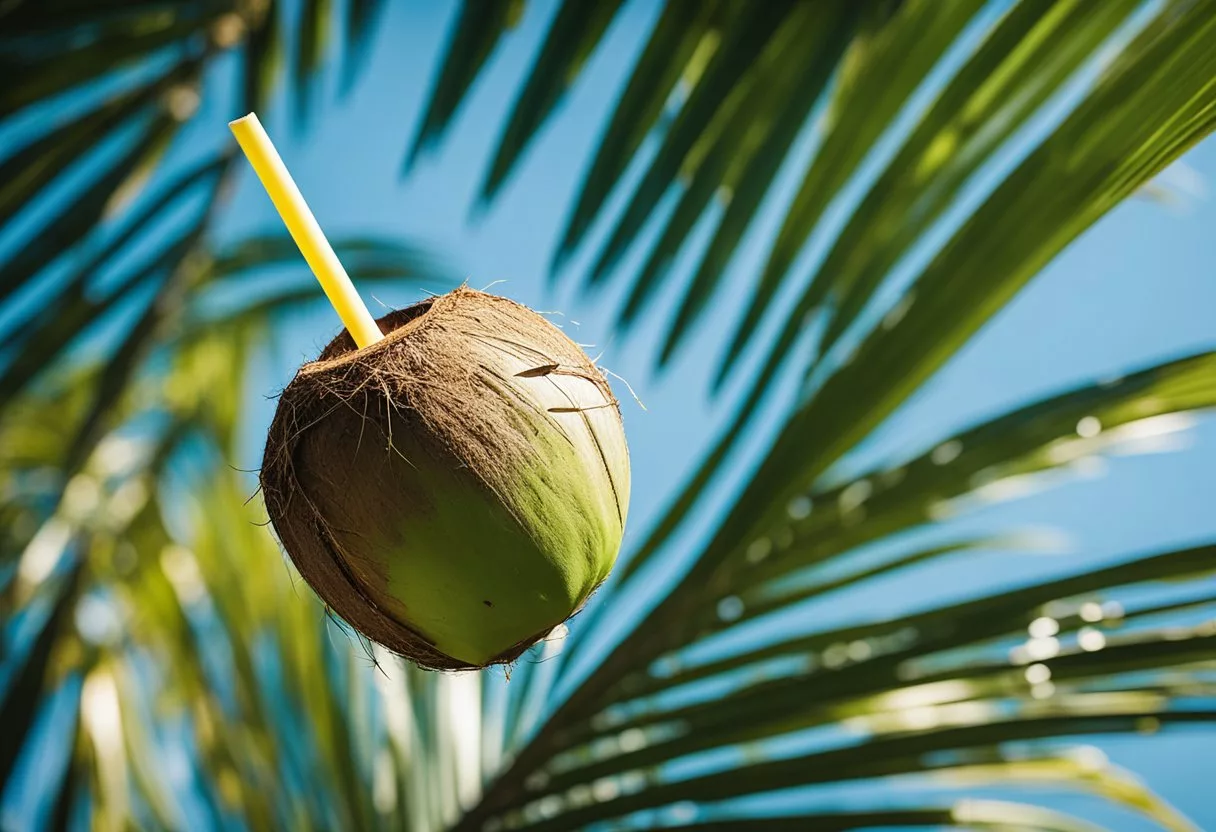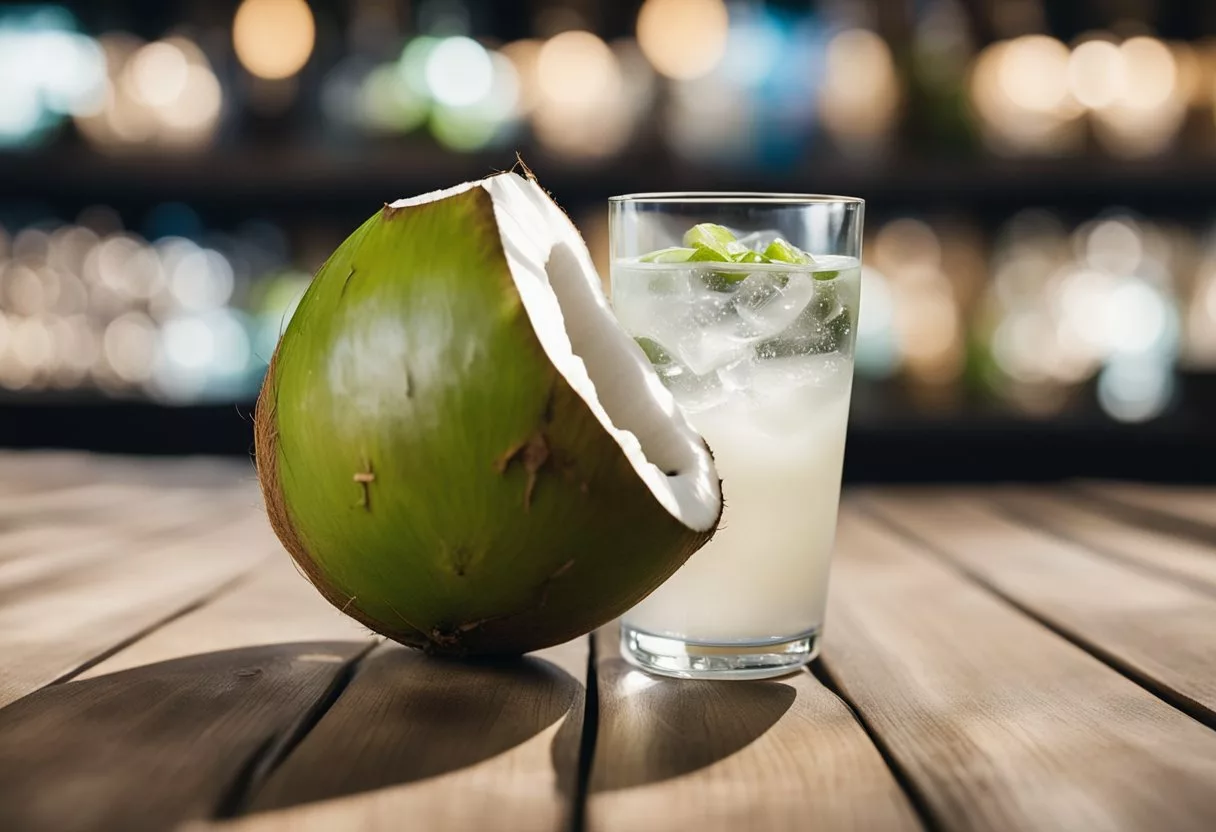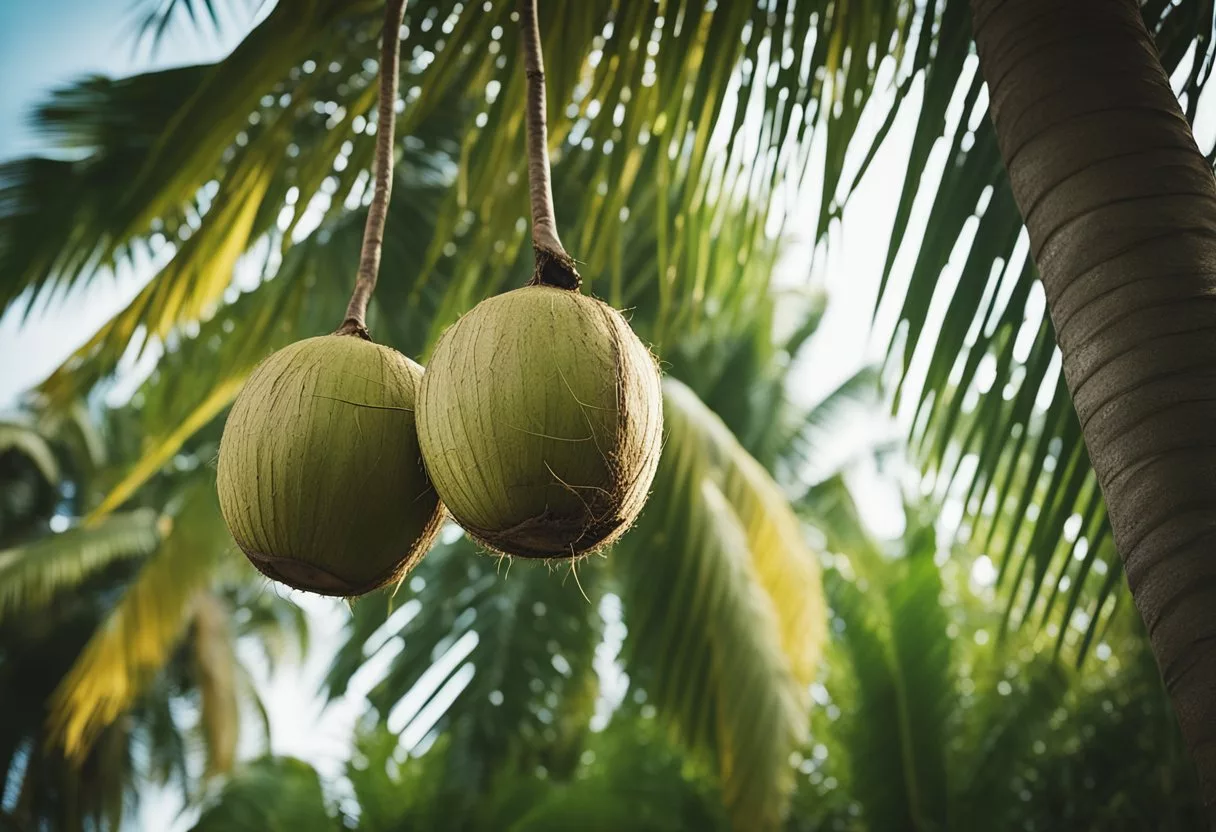Coconut water has become increasingly popular in recent years as a healthy alternative to sports drinks and other sugary beverages. It contains a unique combination of electrolytes, vitamins, and minerals that can help keep you hydrated and support overall health. But what happens to your body if you drink coconut water every day?
First and foremost, coconut water is an excellent source of hydration. It contains natural electrolytes like potassium, sodium, and magnesium, which are essential for maintaining proper fluid balance in the body. When you drink coconut water regularly, you may notice improved hydration levels, which can lead to increased energy, better digestion, and healthier skin.
In addition to hydration, coconut water is also a good source of nutrition. It contains vitamins C and B6, as well as minerals like calcium and iron. These nutrients can help support immune function, promote healthy bones and teeth, and reduce the risk of chronic diseases. Overall, drinking coconut water every day can be a simple and effective way to support your overall health and well-being.
Nutritional Profile of Coconut Water

Coconut water is a refreshing and nutritious drink that has gained popularity in recent years due to its numerous health benefits. It is low in calories and sugar, but high in vitamins, minerals, and electrolytes. In this section, we will take a closer look at the nutritional profile of coconut water.
Vitamins and Minerals
Coconut water is a rich source of vitamins and minerals, including potassium, sodium, magnesium, and calcium. One cup of coconut water contains about 600 mg of potassium, which is more than a banana. Potassium is an essential mineral that plays a crucial role in maintaining fluid balance, regulating blood pressure, and supporting heart health. Sodium is another important electrolyte that helps to maintain fluid balance and regulate blood pressure. Magnesium is essential for muscle and nerve function, while calcium is important for bone health.
Calories and Sugars
Coconut water is a low-calorie drink that contains only about 46 calories per cup. It is also low in sugar, with only about 6 grams of natural sugar per cup. This makes it a great alternative to sugary drinks like soda and fruit juice.
Protein and Fiber Content
Coconut water is not a significant source of protein or fiber. One cup of coconut water contains about 2.6 grams of protein and less than 1 gram of fiber. However, it is still a great addition to a healthy diet due to its high nutrient content.
Overall, coconut water is a healthy and nutritious drink that can provide numerous health benefits. Its high potassium content makes it a great choice for athletes and people who engage in regular physical activity. Its low calorie and sugar content make it a great alternative to sugary drinks.
Hydration and Electrolytes

Rehydration Efficiency
Coconut water is often marketed as a superior rehydration drink. While it is true that coconut water does contain electrolytes, such as potassium, sodium, and manganese, which can help replenish fluids lost during exercise or illness, its effectiveness as a rehydration drink is not clear-cut [1].
A study published in the Journal of the International Society of Sports Nutrition found that coconut water was less effective at rehydrating athletes after exercise compared to a traditional sports drink [1]. However, other studies have suggested that coconut water can be just as effective as a sports drink for rehydration [2].
It is important to note that individual needs for rehydration can vary based on factors such as body weight, sweat rate, and duration of exercise or illness. Therefore, it is recommended to experiment with different rehydration drinks and find the one that works best for each individual.
Electrolyte Balance
Electrolytes are minerals that help maintain fluid balance in the body. Coconut water contains electrolytes such as potassium, sodium, and magnesium [3]. These electrolytes can help replenish fluids lost through sweating or illness, and maintain electrolyte balance in the body.
However, it is important to note that coconut water may not contain enough electrolytes to be a sole source of rehydration for individuals with significant fluid or electrolyte losses [4]. In these cases, electrolyte drinks or medical intervention may be necessary.
Overall, while coconut water can be a refreshing and hydrating drink, its effectiveness as a rehydration drink and sole source of electrolytes may vary based on individual needs and circumstances.
Sources:
- Comparison of coconut water and a carbohydrate-electrolyte sport drink on measures of hydration and physical performance in exercise-trained men[1]
- Coconut water as a rehydration fluid[2]
- Health Benefits and Risks of Coconut Water[3]
- Coconut water: Is it super hydrating?[4]
Health Benefits

Coconut water is a refreshing and nutritious drink that offers a wide range of health benefits. Regular consumption of coconut water can promote heart health, regulate blood pressure, support kidney function, improve bone health, and have metabolic effects.
Heart Health
Coconut water is rich in potassium, which is essential for heart health. Potassium helps to regulate heart rhythm and reduce the risk of heart disease. According to WebMD[3], “A diet rich in potassium is important because it can help lower blood pressure by counteracting the effects of sodium.”
Blood Pressure Regulation
Coconut water is a natural source of electrolytes, which help to regulate blood pressure. One cup of coconut water contains 400mg of potassium, which is more than a banana. According to Cleveland Clinic Health Essentials[5], “Potassium helps remove extra sodium from your body through your urine. This, in turn, lowers your blood pressure.”
Kidney Function Support
Coconut water can help to prevent kidney stones. According to Verywell Health[6], “Water from coconuts may help to prevent kidney stones by reducing crystal and stone formation.” Additionally, coconut water is a natural diuretic, which means it can help to flush out toxins from the body and support kidney function.
Bone Health
Coconut water is a good source of calcium, which is essential for bone health. According to Healthline[7], “One cup of coconut water contains 6% of the daily recommended intake of calcium.” Regular consumption of coconut water can help to improve bone density and reduce the risk of osteoporosis.
Metabolic Effects
Coconut water has metabolic effects that can help to regulate blood sugar levels and improve digestion. According to Health[8], “Coconut water is low in calories but still delivers small amounts of hydrating electrolytes. Unlike coconut milk, which is rich in saturated fat, coconut water is a good source of fiber, which can help to regulate digestion and promote satiety.” Additionally, coconut water contains antioxidants and anti-inflammatory compounds that can help to boost the immune system and reduce inflammation in the body.
In summary, regular consumption of coconut water can provide a wide range of health benefits, including heart health, blood pressure regulation, kidney function support, bone health, and metabolic effects.
Exercise and Performance
Coconut water has become a popular choice among athletes and fitness enthusiasts as a natural alternative to sports drinks. It contains electrolytes such as potassium, sodium, and magnesium, which are essential for hydration and muscle function during exercise.
Post-Workout Recovery
Drinking coconut water after a workout can help with post-workout recovery. It contains antioxidants that can help reduce inflammation and muscle damage caused by exercise. Additionally, the potassium content in coconut water can help replenish electrolytes lost through sweat during exercise, which can help prevent muscle cramps and soreness.
Endurance and Stamina
Coconut water has been shown to improve endurance and stamina during prolonged exercise. A study published in the Journal of the International Society of Sports Nutrition found that coconut water was just as effective as a commercial sports drink in improving performance and hydration in trained cyclists.
While coconut water may not be as effective as sports drinks in providing carbohydrates for energy during intense exercise, it can still be a good option for moderate exercise or as a pre-workout drink.
Overall, incorporating coconut water into a balanced diet and exercise routine can provide numerous benefits for athletic performance and recovery. However, it is important to note that coconut water should not be relied upon as the sole source of hydration during intense exercise and should be used in conjunction with water and other electrolyte-rich drinks.
Potential Risks and Side Effects
Hyperkalemia and Kidney Health
Coconut water is high in potassium, with one cup containing about 600mg of potassium. While potassium is an essential mineral that helps regulate blood pressure and heart function, consuming too much can lead to hyperkalemia, a condition where there is too much potassium in the blood. This can be particularly dangerous for people with kidney disease, as their kidneys may not be able to remove excess potassium from the body. Therefore, people with kidney disease should speak with their doctor before consuming coconut water regularly.
Interactions with Medications
Coconut water can interact with certain medications, particularly those used to treat high blood pressure or heart disease. This is because coconut water can lower blood pressure and have a diuretic effect, which can increase the effects of these medications. People taking medication for these conditions should speak with their doctor before consuming coconut water regularly.
Allergic Reactions
While rare, some people may be allergic to coconut water. Symptoms of an allergic reaction can range from mild (itchy mouth or throat) to severe (anaphylaxis). People with a known allergy to coconuts should avoid consuming coconut water.
It is important to note that while coconut water has many potential health benefits, it is not a cure-all and should not be relied upon as the sole treatment for any condition. As with any food or drink, moderation is key, and those with pre-existing medical conditions should speak with their doctor before consuming coconut water regularly.
Comparison to Other Beverages

Coconut Water vs. Sports Drinks
Coconut water is often touted as a healthier alternative to sports drinks. While both beverages contain electrolytes, coconut water is lower in calories and carbohydrates than most sports drinks. One cup of unsweetened coconut water contains around 46 calories and 9 grams of sugar, while the same amount of a typical sports drink contains around 60-80 calories and 15-20 grams of sugar. Coconut water also contains more potassium than most sports drinks, which can help with hydration and muscle function.
However, it’s worth noting that sports drinks often contain added sugars and preservatives, while coconut water is typically free of these additives. Additionally, sports drinks may be more effective for athletes engaging in high-intensity workouts, as they provide a quick source of energy in the form of carbohydrates.
Coconut Water vs. Coconut Milk
Coconut water and coconut milk are often confused with one another, but they are actually quite different. Coconut water is the clear liquid found inside young, green coconuts, while coconut milk is made by blending coconut meat with water.
In terms of nutrition, coconut water is lower in calories and fat than coconut milk. One cup of coconut water contains around 46 calories and 0.5 grams of fat, while the same amount of coconut milk contains around 552 calories and 57 grams of fat. Coconut milk is also higher in saturated fat than coconut water, which can contribute to heart disease if consumed in excess.
Coconut Water vs. Fruit Juices
Coconut water is often compared to fruit juices, as both beverages can be refreshing and hydrating. However, there are some key differences between the two.
While fruit juices are often high in sugar and calories, coconut water contains less sugar and fewer calories. One cup of unsweetened coconut water contains around 46 calories and 9 grams of sugar, while the same amount of orange juice contains around 112 calories and 21 grams of sugar. Coconut water is also a good source of potassium, while many fruit juices are not.
It’s worth noting that some fruit juices are fortified with vitamins and minerals, while coconut water is not. Additionally, some fruit juices may contain added sugars and preservatives, while coconut water is typically free of these additives.
Consumer Considerations

Label Reading and Brand Selection
When choosing a brand of coconut water, it is important to read the label carefully. Some brands may add sugar or other sweeteners to enhance the taste. Look for unsweetened coconut water to avoid consuming added sugars. Additionally, some brands may add preservatives or other additives to prolong shelf life. Consumers who prefer a more natural product may want to choose brands that use fewer additives.
Natural vs. Added Sugars
Coconut water naturally contains some sugar, but some brands may add additional sweeteners. It is important to be aware of the difference between natural and added sugars when consuming coconut water daily. Added sugars can contribute to weight gain and other health issues, so it is best to choose unsweetened coconut water whenever possible.
Optimal Consumption Practices
While coconut water can be a healthy and refreshing beverage, it is important to consume it in moderation. Drinking too much coconut water can lead to an increase in calories and sugar intake. Additionally, coconut water may not be suitable for everyone, especially those with kidney problems or those who are allergic to coconut. It is always best to consult with a healthcare provider before making any significant changes to your diet.
Overall, coconut water can be a healthy and enjoyable beverage when consumed in moderation and with consideration of brand selection and added sugars.
Incorporating Coconut Water into Your Diet

Coconut water can be a refreshing addition to your daily diet. It can be consumed as a standalone beverage, added to smoothies and recipes, or taken as a supplement. Here are some ways to incorporate coconut water into your diet.
As a Standalone Beverage
Coconut water can be consumed as a standalone beverage. It is best to choose fresh coconut water over packaged ones, as the latter may contain added sugars and preservatives. Coconut water can be consumed before, during, or after exercise to replenish lost fluids and electrolytes. It can also be consumed as a low-calorie alternative to sugary drinks.
In Smoothies and Recipes
Coconut water can be added to smoothies and recipes for a tropical twist. It can be used as a base for smoothies, mixed with fruits and vegetables, or used as a substitute for water in recipes. Coconut water can add a hint of sweetness and provide a source of hydration and electrolytes.
As a Supplement
Coconut water is also available as a supplement in the form of powders, capsules, and concentrates. These supplements may contain higher levels of electrolytes and nutrients than fresh coconut water. However, it is important to choose a reputable brand and consult with a healthcare professional before taking any supplements.
Incorporating coconut water into your diet can provide a source of hydration and electrolytes. It can be consumed as a standalone beverage, added to smoothies and recipes, or taken as a supplement. Coconut water is also a good source of potassium, which is important for maintaining healthy blood pressure and fluid balance in the body.
Summary

Coconut water is a refreshing and nutritious drink that is becoming increasingly popular. It is low in calories, fat-free, and contains a variety of essential nutrients. Drinking coconut water every day can have several health benefits, including:
Hydration
Coconut water is an excellent source of hydration. It contains electrolytes, such as potassium, sodium, and magnesium, which are essential for maintaining proper fluid balance in the body. Drinking coconut water every day can help prevent dehydration, especially during hot weather or after exercise.
Nutrient intake
Coconut water is a rich source of several essential nutrients, including potassium, calcium, and magnesium. These nutrients are important for maintaining healthy bones, muscles, and nerves. Drinking coconut water every day can help ensure that your body gets the nutrients it needs to function properly.
Blood pressure regulation
Coconut water is a natural source of potassium, which is known to help regulate blood pressure. Drinking coconut water every day can help reduce the risk of high blood pressure and related health problems.
Kidney function
Regular consumption of coconut water may assist in kidney function by promoting urine production and preventing the formation of kidney stones. The hydrating properties of coconut water can also be beneficial for skin health, helping to maintain a youthful appearance and potentially alleviating conditions like acne.
In summary, drinking coconut water every day can have several health benefits, including hydration, nutrient intake, blood pressure regulation, and kidney function. It is a refreshing and nutritious drink that can be enjoyed as part of a healthy diet.
References
- Whey Protein Supplementation Enhances Whole Body Protein Metabolism and Performance Recovery after Resistance Exercise: A Double-Blind Crossover Study. https://www.ncbi.nlm.nih.gov/pmc/articles/PMC5537849/ Accessed October 29, 2025
- Anti-Inflammatory and Skin Barrier Repair Effects of Topical Application of Some Plant Oils. https://www.ncbi.nlm.nih.gov/pmc/articles/PMC5796020/ Accessed October 29, 2025
- Coconut Water: Health Benefits, Nutrition and Uses. https://www.webmd.com/diet/health-benefits-coconut-water Accessed October 29, 2025
- Coconut water: Is it super hydrating?. https://www.mayoclinic.org/healthy-lifestyle/nutrition-and-healthy-eating/expert-answers/coconut-water/faq-20207812 Accessed October 29, 2025
- 6 Health Benefits of Coconut Water. https://health.clevelandclinic.org/the-health-benefits-of-coconut-water Accessed October 29, 2025
- Verywell Health. https://www.verywellhealth.com/coconut-water-7979107 Accessed October 29, 2025
- The Health Benefits of Coconut Water. https://www.healthline.com/nutrition/coconut-water-benefits Accessed October 29, 2025
- Health. https://www.health.com/coconut-water-benefits-8424786 Accessed October 29, 2025
